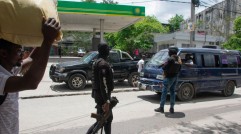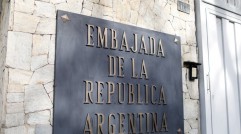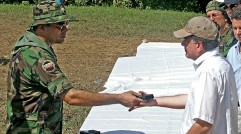Thailand Elections & Coup: Military Says Elections WIll Not Be Held for More Than a Year
The leader of Thailand's military said Friday that elections for a civilian government will not be held for more than a year, meaning the military junta will lead well into 2015.
The military said there will be a lengthy wait time to allow the country to broker successful political negotiations and reform.
According to BBC News, Gen. Prayuth Chan-ocha said in a televised address that opposing sides of the political spectrum should cooperate with one another and stop protesting so peace can be achieved.
The military declared martial law in the country on May 22, claiming it took over to restore peace to the country after months of political unrest.
While the military first denied that it was a coup, military leaders admitted that it was a coup a couple days later.
The leaders of the coup earned a royal endorsement of the takeover on Monday.
"The (ruling military regime) have a timeframe of one year and three months to move towards elections," Gen. Prayuth said in his first public address since the takeover.
"Enough time has been wasted on conflict," he added.
Gen. Prayuth said that the first three months of the junta will focus on "reconciliation" with a political cabinet, and a new constitution will be drafted and enacted.
Afterwards, they claim that reforms will be enacted in the second period, which will happen over the course of a year. They say that only afterwards can democratic elections be held to elect a new civilian government.
"Give us time to solve the problems for you. Then the soldiers will step back to look at Thailand from afar," Prayuth added.
During the televised address, the general reiterated warnings against protesting the military junta, saying the military only intends to bring "happiness" back to Thailand.
He said that he will have to use force if protests persist.
The military implemented an intense crackdown to prevent protests from breaking out. Hundreds of troops sealed off an intersection in Bangkok during rush hour Friday to prevent protesting.
Thailand's military took over after six months of political unrest because of citizens trying to oust Prime Minister Yingluck Shinawatra. At least 28 people were killed in protests.
The military has since detained many political figures, including Yingluck, who was forced to step down from her post.
Subscribe to Latin Post!
Sign up for our free newsletter for the Latest coverage!














